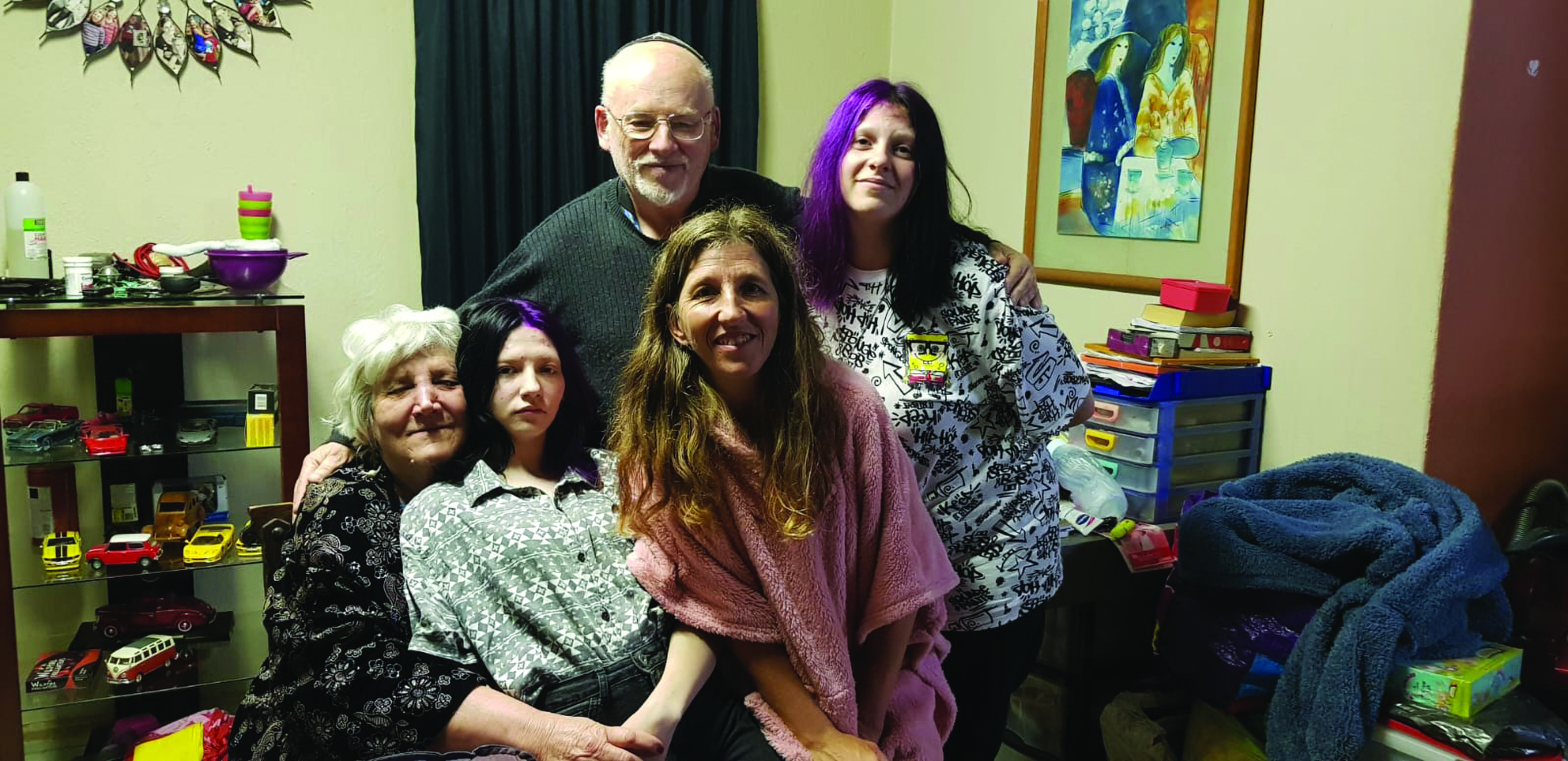One man’s unexpected journey through adoption, identity, and Divine providence.
By: Ilan Preskovksy
Imagine growing up in a loving home with a rich family life, only to find out at the tender age of 34, and only by an accidental slip of the tongue, that your parents are not your – if you’ll pardon the expression – “real” parents: that you were adopted as a toddler and were never told your true origins. Imagine that you have suffered from a genetic condition like Tourette’s syndrome since you were very young without every understanding exactly why you were the only one in your family to be diagnosed with it. Imagine being brought up in a religious Jewish home as a Levi only to find out that your birth mother wasn’t even Jewish.
Leon Lipschitz doesn’t need to imagine it. This is exactly what happened to him. And as I sat down with Leon and his wife, Linda, and listened to them expand on his story of self-discovery, it became increasingly clear that this was a true story that feels like it was dreamed up by a Hollywood screenwriter, so full it is of dramatic twists, incredible coincidences, lost and restored faith, and bitter-sweet reunions.
A Rude Awakening
Setting the scene, Leon starts his story: “It was March 31, 1986, and we [Leon, Linda, their kids, and his father – his mother had passed away four years prior] were in Warmbaths and while there, we met my uncle Jack and Sarah Lipschitz and they invited us for lunch. After lunch, my dad asked me to take him home, to our flat in Warmbaths, to rest, but my auntie Sarah said to my dad, ‘Don’t worry, Uncle Sidney, you go upstairs to the room and you can have a schlof over there, and then you can come back and have tea with us.’ So, my dad said okay. I escorted him up, because he was a little bit unsteady, and my auntie Sarah turned around to Linda and said, ‘You know, Sidney is so lucky to have him, especially considering he’s not their son.’ Linda’s jaw just dropped and auntie Sarah said, ‘Oh my G-d, what have I done?’” She’d just revealed a secret that Leon wasn’t supposed to know.
When they got back to their place later, Leon asked Linda why she seemed so troubled and after “humming and hawing” for a while, he got her to repeat what her aunt had told her: that he was adopted. He was, to say the least, taken aback, and after some deliberation he decided that he was going to try find out more but without telling his father that he knew: “It was a shock. I went for a two hour walk around Warmbaths. Linda and the kids were freaking out what happened to me because they didn’t know where I was or anything. And I obviously tossed and turned [it around in my head]. You know, the where, why, how, what of it all. And I decided, because my parents had been so good to me, I wasn’t going to tell my dad that I knew.”
“I was forecast to die by age 5… Thanks to them, I’m now pushing 73!”
Interestingly, when he was younger, others would make comments about Leon being adopted, but when he asked his parents what they were talking about, they would brush it off saying, “You were a very special child and you were specially chosen by us.” But at the time, Leon admits, he just “never connected the dots”. This, despite his being the only person in his family to have Tourette’s syndrome: a genetic condition that tends to run in families.
He decided that as long as his father was alive, he wasn’t going to search for his birth family. And, aside for a quick call to his lawyer to confirm that he was indeed adopted, he kept his word. Sadly, his father died only three months later. “It was only as I stood looking at his deceased body,” Leon admits, “that I broke the news to him that I knew and asked for his blessing that he won’t be offended if I start looking for my birth family.” But before he even had a chance to search for his birth family, he was rudely awakened to his reality when the rabbi of his shul asked him during prayers to give him his ketubah so that he could amend it to say that he was not a Levi. A fair request, perhaps, but Leon was so hurt by the callousness in which it was handled that he swore off shul for years. “I had a nervous breakdown. I’d known for three months already. But the way he said it, I was so shocked. To this day, I still have not said proper kaddish for my dad because straight after that I left the shul and I only came back when I got [use of] my hand back in 2003 (see sidebar).”
Beginning His Search
After keeping his promise not to look for his birth family while his father was alive, his search began in earnest. The problem was that this was the mid-1980s and it was decidedly less easy for an adopted child to find their birth parents. Aside for the obvious lack of internet, Leon explains that at the time most adoptions were “closed” – that it was literally impossible to connect people who were adopted with their birth parents. As it so happens, though, just as Leon started his search, a new programme was launched called “Search for Your Origins”, where you would at least be able to find out details about your adoption if both the adopted person and his or her biological parents entered information into their database. And, a number of months later, he received the information: who his biological parents were and what his birth name was.
“They had been waiting 25 years for that phone call.”
Still, nothing came of it until one night in 1990 when: “It’s three o’clock in the morning, and Linda punches me awake. And she says, Leon, you’re going to find your family. I said, no, what do you mean I’m going to find my family? I, you know, I’ve been looking for four years already. It’s not going to come just like that. But she says, ‘Leon, I’m telling you, you’re going to find your family.’ I told her that I haven’t got time for this nonsense and turned around and went back to sleep. Two minutes later, again another punch. ‘Leon, I’m telling you, you’re going to find your family,’ she says again, ‘I had a dream that Anne’s mom [a close family friend whose mother was dying] came to me and gave me a letter saying ‘I want you to go and find my son that I gave up for adoption.’” That morning, they received the news that Anne’s mother had indeed passed away, with the funeral being held the next day. After attending the funeral, Leon was looking through the “Hatch, Match and Dispatch” section of the Classifieds (remember those?) to look for the death notice that he and Linda had submitted for Anne’s mother when he happened to spot, just under it, a notice for someone named Peter Condie.
Leon’s birth mother’s name was Condie.
Connection at Last
There were, as it turns out, only two notices for Peter, one from his family and one from a company called Kirkland, so he called up the company and gave the person he spoke to there some details about himself and waited for him to get back to him. Which he did a few days later and proceeded to fill in some of the gaps in Leon’s story, and provided him with a contact number to try get hold of the family. From there, Leon contacted the social worker he had been using as an intermediary for matters related to his adoption and asked her to try find out more about Peter Condie and whether they were indeed related. He had promised her that he would keep her informed of everything that was happening and would involve her in the process to avoid any unwanted unpleasantness. So, she gave the family a call and confirmed that Peter was indeed Leon’s half-brother, that they shared the same mother but different fathers, along with getting a number for his other half brother, Raynor.
Leon dials the number he was given, expecting a certain coldness from a family who had just lost someone only to have this stranger call up from out of the blue saying he’s a long lost brother. What happened, however, was something else entirely.
“So Raynor comes to the phone, and I tell him my name is David Lawson. Which was my birth father’s name. And the next minute he gives me everything. Name, rank, serial phone number, the works. When we met him down in Cape Town a year later, Linda asked his wife, how come a total stranger phones up and asks for personal information, and your husband just gives it like that. As it turns out, they had been waiting 25 years for that phone call.”
The Condies, as it turns out, had never heard Search for Your Origins.
The half-brothers quickly established a good relationship and Leon finally found out what happened to his mother: She had tragically died in a fire on 23 July 1975. But Leon had somehow already sensed that: “On that particular day, I woke up, I was crying, I was depressed, I was morose. And I never knew why. Somehow or other, I think, or I feel, her last thoughts as she was dying was what happened to my son that I gave up for adoption.”
One other extraordinary wrinkle to this story: Leon found out that his adopted parents had adopted him as a very, very ill child: “I was forecast to die by the age of 5 due to a heart condition, so my parents were told they could not adopt me. Still they persisted, brought me home, and immediately got me to have heart surgery. Thanks to them, I am now pushing on for 73!”
As for his birth father, Leon found out that he was alive and had a wife and kids of his own, but when he tried to reach out to him, Leon was repeatedly told that it was an “inconvenient time” for them to meet until, finally, he stopped hearing from him completely.
Ultimately, Leon came to understand why his parents never told him he was adopted. Those were different times and adoption still had a certain stigma attached to it. More than that, he feels that they probably worried that if he was told, he might reject them as his “real parents”. Still, he is a strong advocate for parents telling their children if they’re adopted and as much as they can about their past, even just – or perhaps especially – to find out more about their medical history. As, for example, his Tourette’s. “I’ve written some articles about adoption and the dangers of not telling. Because, like I say, I always say the truth will out eventually. I mean here is a prime case of the truth coming out. Look, I do understand there are troubles with adoption, because a child can turn around and I see it quite often. You’re not up here and so you’ve got no right to tell me what to do. Absolutely. Sure. That is a big problem. The other problem is what I call the hidden, the hidden bomb, time bomb. Because it can happen that you don’t know that you’re adopted. Somewhere down the line you get sick. You need to know the medical condition.”
But, as his story makes clear, sometimes things happen in their right time.
Sidebar
After undergoing a botched surgery meant to fix a broken arm, Leon’s hand was left totally paralysed and he was told that there was nothing to be done. Linda, though, who had little time for the “heavenly decrees” of doctors, insisted that they “go get a second, third, even fourth opinion”. Finally, they ended up at the Mill Park and a specialist there assured them that he could help, at least a bit with a tendon transfer. But he doubted that he would be able to restore anything more than a very limited amount of mobility to Leon’s hand. That is not, however, what happened: “After nine-and-a-half-hours,” Leon explains, “the doctor comes out and says the operation went better than he expected. That I might have a little bit more use of the hand. But he says, ‘I’m sorry, I never did the operation.’ Then Linda says to him, ‘What do you mean you never did the operation? You were in the theatre. You must have done it!’ And he said, ‘No, all I remember is picking up the scalpel and putting it down and sensing someone taking my hand and guiding my hand.’ To this day, he still says this operation was absolutely impossible.” That “little bit of extra use”, as it turns out, was nothing less than the full return of the use of his hand.





